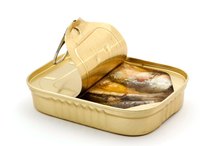Nutritional Content of Canned Oysters
If you are looking for healthy, convenient foods to boost your nutrient intake, consider adding canned oysters to your meal plan. These shellfish are nutritious additions to salads, soups and other dishes. Canned oysters are not only quick to prepare, but because they are already cooked, they are also safer choices than raw oysters for preventing food-borne illnesses.
Calories and Macronutrients
A 6-ounce portion of canned oysters has only 116 calories, so they can help you lose weight or maintain a healthy weight. Oysters have 12 grams of high-quality protein. Unlike fish and some other kinds of shellfish, such as shrimp, oysters are a natural source of carbohydrates, with 6.6 grams of carbs per serving. They have 6 grams of total fat, including 1 gram of saturated fat. Oysters do, however, contain 94 milligrams of cholesterol. This makes up roughly one-third of your daily cholesterol limit, or one-half if you suffer from high cholesterol or heart disease.
- A 6-ounce portion of canned oysters has only 116 calories, so they can help you lose weight or maintain a healthy weight.
Omega-3 Fatty Acids
Are Snails Healthy to Eat?
Learn More
Canned oysters come packed with omega-3 fatty acids. A 6-ounce serving of canned oysters supplies 358 milligrams eicosapentaenoic acid, or EPA, and 388 milligrams of docosahexaenoic acid. These omega-3 fatty acids might lower your risk for heart disease when you average a total combined intake of at least 250 milligrams per day, according to the 2010 Dietary Guidelines from the U.S. Department of Health and Human Services. Just one serving of oysters provides almost one and a half times this intake goal.
- Canned oysters come packed with omega-3 fatty acids.
- A 6-ounce serving of canned oysters supplies 358 milligrams eicosapentaenoic acid, or EPA, and 388 milligrams of docosahexaenoic acid.
Zinc
A 6.ounce serving of canned oysters supplies 154 mg zinc, or 1026 percent of the daily value. Zinc is an essential mineral for your immune system, and adequate intake might lower your risk for age-related macular degeneration, according to the Linus Pauling Institute Micronutrient Information Center. Individuals at higher risk for zinc deficiency include strict vegetarians who do not consume animal products, older adults and individuals with nutrient malabsorption conditions. Canned oysters are so high in zinc that you should actually watch out for a zinc overdose if you consume them on a regular basis -- they contain more than the upper daily limit, which is 40 milligrams for adults. Avoid eating canned oysters every day to prevent a toxicity.
- A 6.ounce serving of canned oysters supplies 154 mg zinc, or 1026 percent of the daily value.
- Canned oysters are so high in zinc that you should actually watch out for a zinc overdose if you consume them on a regular basis -- they contain more than the upper daily limit, which is 40 milligrams for adults.
Other Micronutrients
Sodium & Oysters
Learn More
Iron is an essential nutrient for healthy red blood cells, and a 6-ounce portion of canned oysters has 11.4 milligrams of iron, or 64 percent of the daily value. They have 92 milligrams magnesium, or 24 percent of the daily value. Magnesium is necessary for proper muscle and heart function. Vitamin B-12 is a nutrient that is only naturally present in animal-based foods, and oysters provide 32 micrograms of vitamin B-12, all you need in a day.
- Iron is an essential nutrient for healthy red blood cells, and a 6-ounce portion of canned oysters has 11.4 milligrams of iron, or 64 percent of the daily value.
Related Articles
References
- U.S. Department of Health and Human Services; "Dietary Guidelines for Americans"; January 2010
- Linus Pauling Institute Micronutrient Information Center; "Zinc"; Victoria Drake; February 2008
- HealthAliciousNess: Mollusks Oyster Eastern Canned
- Mollusks, oyster, Pacific, raw. FoodData Central. U.S. Department of Agriculture. Published April 1, 2019.
- 7 Reasons to Love Oysters-Even If You Hate Them. Cleveland Clinic. Updated 2016.
- Zinc: Fact Sheet for Health Professionals. National Institutes of Health, Office of Dietary Supplements. Updated 2020.
- 10 Tips: Eat Seafood Twice a Week. ChooseMyPlate U.S. Department of Agriculture.
- Ihn HJ, Kim JA, Lim S, et al. Fermented oyster extract prevents ovariectomy-induced bone loss and suppresses osteoclastogenesis. Nutrients. 2019;11(6). doi:10.3390/nu11061392
- Tischmann L, Drummen M, Gatta-Cherifi B, et al. Effects of a high-protein/moderate-carbohydrate diet on appetite, gut peptides, and endocannabinoids-A preview study. Nutrients. 2019;11(10). doi:10.3390/nu11102269
- Kaufman C. Foods to Fight Iron Deficiency. Academy of Nutrition and Dietetics. Updated 2020.
- Shellfish allergy is not a shell game. American Academy of Asthma, Allergy & Immunology. Updated 2020.
- Risks of Eating Raw Oysters and Clams. Virginia Department of Health. Updated 2018.
- Types of oysters. Berkeley Wellness University of California. Updated 2015.
- Dolaski AM. True or False: Only Eat Oysters in Months That End in 'R'. American Council on Science and Health. Updated 2016.
- Phillips KE, Satchell KJ. Vibrio vulnificus: From oyster colonist to human pathogen. PLoS Pathog. 2017;13(1):e1006053. doi:10.1371/journal.ppat.1006053
- Hassard F, Sharp JH, Taft H, et al. Critical review on the public health impact of norovirus contamination in shellfish and the environment: A UK perspective. Food Environ Virol. 2017;9(2):123–141. doi:10.1007/s12560-017-9279-3
Writer Bio
Natalie Stein specializes in weight loss and sports nutrition. She is based in Los Angeles and is an assistant professor with the Program for Public Health at Michigan State University. Stein holds a master of science degree in nutrition and a master of public health degree from Michigan State University.









